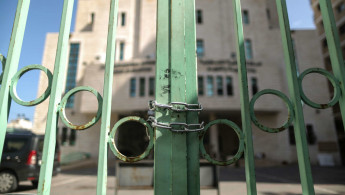Gaza strikes after Israel kills fisherman, imposes Purim lockdown
Gaza's fishermen join the government workers to strike over unfair treatment both by the Israelis and their own government, as Israel imposes total lockdown of the Palestinian territories over Purim
3 min read
Anger boils over as Gazans feel strangled by both Israel and their own government [Getty]
The Gazan fishermen's union is striking on Monday and Tuesday, in protest over the deadly Israeli policing of Gaza's waters, which resulted in the killing of a teenage fisherman on Sunday.
The fishmermen's strike coincides with a general strike held by Gaza's government workers, including teachers, who are protesting neglect by their government as well as unpaid salaries.
Gaza's hospital cleaners have been on strike since 4th February after five months without pay, which has led to a hygiene crisis in the enclave's key healthcare facilities, forcing operations to be cancelled and putting patients at risk of infection.
On Sunday, 18-year-old Ismail Abu Ryala was shot and killed by Israeli naval forces, after allegedly breaching the arbitrary line of six nautical miles, imposed by the Israeli authorities for Palestinians to fish.
The head of the Syndicate of Palestinian Fishermen, Nizar Ayyash, refuted claims that the young fishermen crossed the Israeli-imposed fishing borders.
He told PNN that the Israeli navy fired a barrage of live bullets at their boat while on their way back to the port, wounding the three young men, one of whom later died of his wounds.
Israeli forces meanwhile announced a total shutdown of the occupied West Bank and Gaza Strip over the Jewish festival of Purim from Tuesday night until Saturday night, due to the perceived "security situation", according to Israel.
The fishmermen's strike coincides with a general strike held by Gaza's government workers, including teachers, who are protesting neglect by their government as well as unpaid salaries.
Gaza's hospital cleaners have been on strike since 4th February after five months without pay, which has led to a hygiene crisis in the enclave's key healthcare facilities, forcing operations to be cancelled and putting patients at risk of infection.
On Sunday, 18-year-old Ismail Abu Ryala was shot and killed by Israeli naval forces, after allegedly breaching the arbitrary line of six nautical miles, imposed by the Israeli authorities for Palestinians to fish.
The head of the Syndicate of Palestinian Fishermen, Nizar Ayyash, refuted claims that the young fishermen crossed the Israeli-imposed fishing borders.
He told PNN that the Israeli navy fired a barrage of live bullets at their boat while on their way back to the port, wounding the three young men, one of whom later died of his wounds.
Israeli forces meanwhile announced a total shutdown of the occupied West Bank and Gaza Strip over the Jewish festival of Purim from Tuesday night until Saturday night, due to the perceived "security situation", according to Israel.
 |
|
| Palestinians staged a protest on Sunday using fake gravestones to symbolise the victims of of the Israeli blockade of the enclave [Getty] |
Palestinians will only be allowed to exit Gaza and the West Bank in pressing humanitarian and medical cases, according to the statement released on Sunday, it was reported by al-Araby al-Jadeed.
It is customary for the Israeli forces to shut down checkpoints and entry and exit points to the occupied Palestinian territories during Jewish holidays - on the pretext of various security reasons - which imposes major restrictions on freedom of movement of Palestinians. Israeli settlers, however, remain free to move as they please.
The Israeli security agency Shin Bet submitted a report to senior Israeli security officials last week that called the situation in Gaza serious, but not at humanitarian crisis levels, according to Haaretz.
Shin Bet's report comes in stark contrast to remarks made by Israeli Defense Force chief Gadi Eisenkot, who warned earlier this month that Gaza was on the brink of collapse due to the humanitarian crisis ongoing in the enclave.
The sealing off of Gaza, as well as the West Bank, could exacerbate the humanitarian situation even more, preventing Palestinians from accessing medical care, humanitarian assistance, as well as reaching their workplaces and visiting family and friends.





 Follow the Middle East's top stories in English at The New Arab on Google News
Follow the Middle East's top stories in English at The New Arab on Google News


